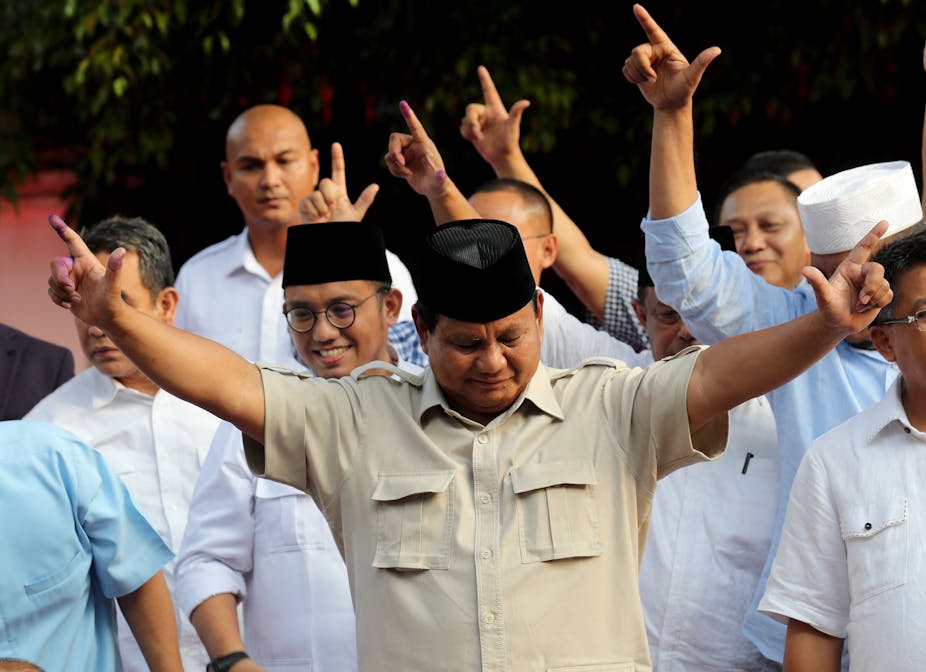It is official. Indonesia’s president Joko “Jokowi” Widodo is reelected for the second time. This is also the second failed attempt from former military general Prabowo Subianto to become president of the world’s third largest democracy with the biggest Muslim population.
After more than a month tallying votes from the 17 April election, the General Elections Commission (KPU) formally announced Jokowi’s reelection on May 21.
Not long after the announcement, Prabowo’s camp declared that they will challenge the result to the Constitutional Court, a similar move he took five years ago. The Court, in 2014, rejected Prabowo’s lawsuit due to insufficient evidence.
The article will describe the legal process that Prabowo must undergo for his case, and why it will likely fail.
Constitutional Court’s mandates
The Constitutional Court is one of the judicial powers in Indonesia. It holds four mandates:
reviewing laws to decide if they are in accordance with Indonesia’s Constitution–whether it is “constitutional” or “unconstitutional”
settling disputes over the authority of state institutions
deciding dissolution of political parties
settling disputes over the results of general elections.
Prabowo’s lawsuit falls under the Court’s last authority.
Under his current lawsuit, Prabowo hopes the Court will nullify KPU’s decision and disqualify his opponent, Jokowi, which ultimately will lead to Prabowo winning the election.
Breakdown of the legal process
The process will begin when Prabowo files the lawsuit to the Court’s clerk
The clerk will examine the documents to ensure they include the applicants’ identities and their demands.
The Court will inform Prabowo that whether his lawsuit meets the Court’s initial requirements. If the conditions are not met, Prabowo will be given one day to revise and complete his lawsuit, then file it back to the clerk. After the Court decided that the lawsuit qualifies for a preliminary hearing, the Court will announce a date. The Court will also inform, and invite, the defendant and other related parties (in this case, Jokowi and KPU) to the hearing.
During the hearing, judges will ask Prabowo about his lawsuit and give suggestions related to Prabowo’s demands. He will then be given time, up to three days, to revise it.
After the revision, the Court will hold trials to examine whether the claims made by Prabowo are legally sound. During the hearing, the judges will listen to the testimony from plaintiffs, defendants, other related parties, and experts. There will be at least two sessions of the trial, held on different days - one to hear the plaintiff’s side and another to hear from other parties.
The court will also examine written evidence, cross-examine the testimonies of the witnesses, and examine other proofs and clues. Written evidence include, but are not limited to, the KPU’s documents supporting the declaration of Jokowi’s victory.
After all those processes, the Court will decide whether to grant or to deny the motions, within a maximum of 14 working days since the case is registered.
Trial schedule
The 2017 Law on Elections states candidates who are unsatisfied with election results can submit a lawsuit to the Constitutional Court by no later than three days after KPU announces the results.
Thus, the deadline for Prabowo to formally file his lawsuit is on May 24.
Once Prabowo filed his lawsuit, the Court will register the case on June 11 and will notify the other related parties to attend the preliminary hearing.
On June 14, the preliminary hearing will take place, and Prabowo will be given time until June 17 to revise his application. After that, the Court will hold trials to further examine the case from June 17 to 21.
The judges are expected to read the final verdict by June 28.
Decision options
The Court has three final decision options - not to process the case, to grant the plaintiff’s demands or to reject them.
The Court will not process a lawsuit if it does not meet requirements. This include mistyping the identity of the plaintiffs, the plaintiffs are not valid candidates, or the plaintiffs pass the 3-day deadline to file the lawsuit.
The Court will reject a lawsuit if it is unlawful. Prabowo faced such rejection in 2014. The Court decided to reject his demand due to insufficient evidence.
The final option is the Court will grant the plaintiff’s motions when they are proven to be legally sound.
If the Court grants Prabowo’s motions, the Court will nullify KPU’s decision and determine the right result of the election.
However, if the Court decides to deny Prabowo’s motions and therefore reject his lawsuit, this will lead to Jokowi’s victory, as the Court’s decision is final and binding.
Difference between 2014 with 2019
In 2014, when Jokowi won by a slim margin, Prabowo only had to bring evidence from 57,000 polling stations.
This year, according to the KPU, Jokowi wins by 16 million votes over Prabowo.
To prove electoral fraud in the 2019 election, Prabowo has to show that there are at least 100 frauds in 100,000 to 200,000 polling stations.
Therefore, it seems that Prabowo’s lawsuit will also end up in vain.
Las Asimi Lumban Gaol translated this article from Indonesian.


